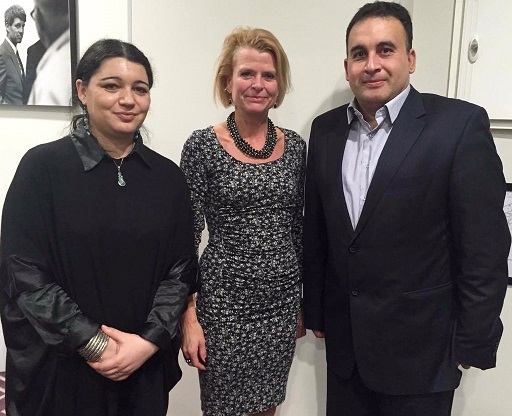10.02.2016Teodora Krumova participated in a meeting with Asa Regner, Swedish Minister for Children, the Elderly and Gender Equality

Åsa Regnér, Swedish Minister for Children, the Elderly and Gender Equality, and her team (Ms Joanna Abrahamsson, Press Secretary to Minister Regnér, Mr Per-Anders Sunesson, Deputy Director General, Division for Family and Social Protection, Ministry of Health and Social Affairs of Sweden, Mr Ronnie Nilsson, Senior Adviser, European Union Department, Ministry for Foreign Affairs of Sweden and Ms Louise Bergholm, Ambassador of Sweden to Bulgaria) had a discussion with NGOs working in the field of Roma inclusion. Ms Regnér was in Sofia on February 5th for a one-day bilateral visit.
The purpose of the round table discussion was to give minister Regnér the opportunity to meet with representatives for Bulgarian civil society working on both policy and projects focusing on the Roma minority on issues such as raising awareness of the situation of the Roma minority, increase the knowledge among the Roma population of their rights, alleviating poverty among the Roma population through education, health and social services and other related issues. The meeting was attended by Yva Alexandrova, Center for the Study of Democracy, Maria Jesús Conde, UNICEF, Gancho Iliev, World Without Borders Association, Teodora Krumova, Center for Interethnic Dialogue and Tolerance – Amalipe, Sarah Perrine, Trust for Social Achievement and Thomas Rudmoen Lökken, Europa i Fokus.
Teodora Krumova from Center Amalipe underlined that there is a high need for stronger national policies directed to Roma inclusion as well as a stronger coordinating body. The national authorities and the Mr. Kalfin, in which portfolio the Roma policies are, should take the lead also in sanctioning the hate speech and changing the negative trends for multiplying myths and stereotypes about Roma. This creates a hostile environment for Roma integration issues, lack of public support for Roma integration policies and additionally increases the gap between minority and majority. At the same time, the change is there, a lot of successful story have been already accumulate on the ground. Quantitative accumulations lead to qualitative changes and there is already a change in some of the negative tendencies such as early marriages, school dropout and so on. Nevertheless, Mrs. Regner also agreed that the State and various institutions should have stronger ownership on the Roma integration processes. Teodora Krumova further added that the Community does not need social assistance but an opportunity for developing its own capacity, mobilizing its own resources and empowerment the vulnerable groups within the community, such as women and young people. Maria Jesus Conde also confirmed that at present the public support for Roma activities is very low. She gave the example of a UNICEF campaign focusing on the support for Roma children: the campaign has accumulated 0 funds, while similar campaigns without mentioning Roma have accumulated enormous amount of funds.
Iva Alexandrova presented the recent study by the Center for Study of Democracy which main conclusion was that public investments in Roma integration would bring to a significant change in the situation, as Kavarna model has shown. Sarah Perrine presented the work of the Trust for Social achievement and underlined that the most efficient investment for Roma development is in early childhood development. She presented the initiative of TSA and the World Bank “Springboard for school readiness” which inevitable shows that decrease or exemption from taxes might lead to almost 100% presence of the children at the kindergarten. Gancho Iliev continued this thought pointing out that the other high need in Roma education is banning segregated schooling which is the present-day genocide against the Roma community.
The meeting generated a number of ideas evolving from the good practices already existing in the two countries and among both, public institutions and civil society. It marks the first steps of a further cooperation for improving the situation of Roma in both, Bulgaria and Sweden.
After the round table Mrs.Regner met with Deputy Prime Minister, Minister for Labour and Social Affairs Ivailo Kalfin. The ministers finalized and signed a Letter of Intent on cooperation on vulnerable groups, and a Working Programme for the first two years of cooperation. The work would focus on social security issues, childrens’ rights, the elderly, persons with disabilities and gender equality. The Roma population in Bulgaria is identified as one of the core groups for the cooperation. Civil society organizations are recognized in the Letter of Intent as important actors in this field of work.
\"This agreement places greater emphasis on issues dealing with the elderly and people with disabilities than the agreement we signed with Romania. This was requested by Bulgaria and is an area in which we have long experience, both in Sweden and internationally. Through the exchange of knowledge, experience and good practice, and by promoting cooperation between non-profit organisations, we can improve the lives of vulnerable people" says Ms Regnér.








